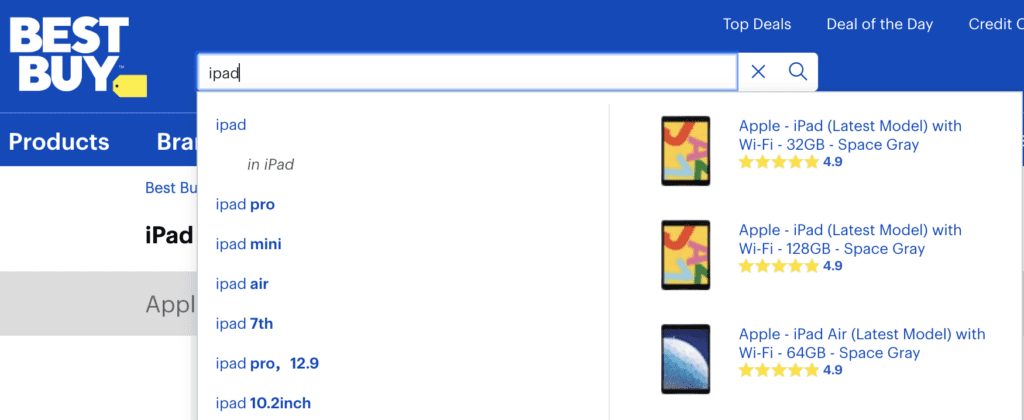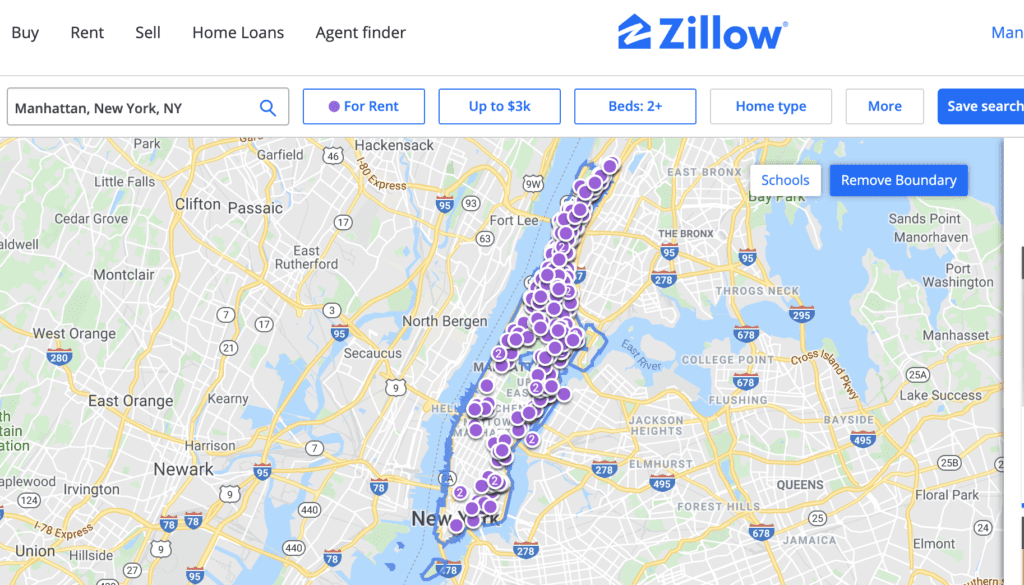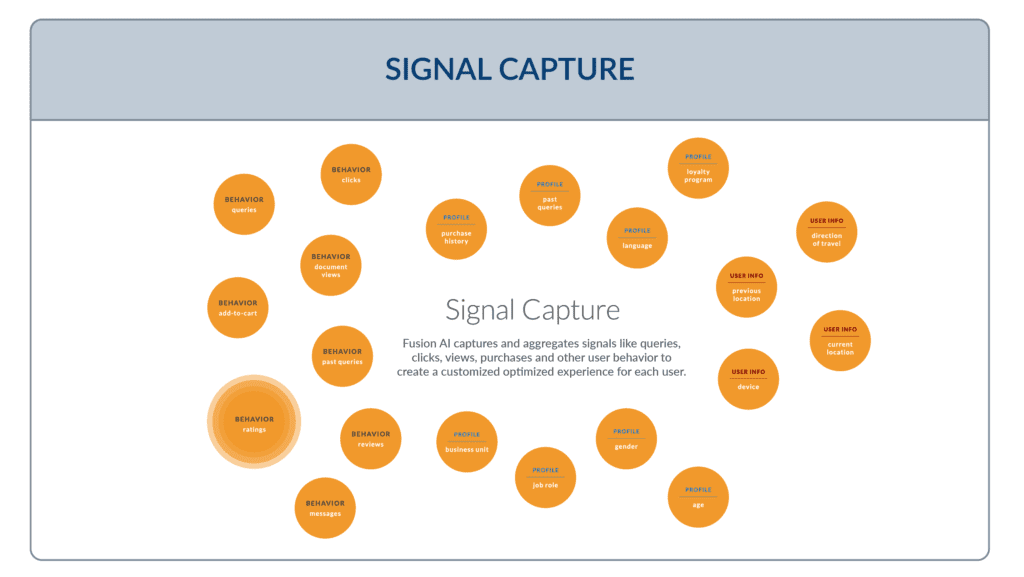What Is AI-Powered Search?
Learn about what AI-powered search means and what value it can generate for your business.

Search, and ye shall find. But search with an AI-powered search platform, and ye (or ye customer) shall find, learn, and even discover!
Although most vendors say their search platform is fortified with AI, “AI-powered” isn’t a phrase that should be used lightly. So what does AI-powered search mean and what is the value it can generate for your business? Lucidworks’ Senior Solutions Architect, Karthik Chelladurai explains, “Basic search is matching the text of your search term with the text in the document database. AI-powered search technology allows us to bring in multiple dimensions of the user and data available to produce the most relevant results.”
Let’s zoom out to understand those additional dimensions, how they impact the user’s search journey, and how AI-powered search can create immense value for businesses.
Back to Basics: What Is Search?
Think of basic search as an ecosystem that takes your query, scans through all the information available, and then presents the items with an exact text match to the keywords you entered. For example, if you go on bestbuy.com and search “iPads” you expect the site to go through its product catalog and show you iPads. But what if you wanted to view iPad covers? Or what if it shows you the iPad 3 you purchased from the site? Or what if you put a space in between “i” and “pad” and you get the dead-end “No Results Match your Query” pop-up or return results for pads of paper or mouse pads?

So many things can create friction and prevent users from finding the information they need, including missed opportunities to make smarter recommendations and a failure to learn from user behavior to serve them and others better the next time.
“For me, AI-powered search means learning from the user to deliver the next best action, and the capability of the system to auto-tune results based on what it learns from users.”
Put User Data to Work for a More Valuable Experience
Many search platforms, such as Google Search Appliance (GSA), don’t learn much from an individual user’s behavior or search history; you’ll be given the same results as anyone else who searched for those same words on the site, regardless of your previous queries and clicks. While collecting data on user behavior is already common practice for many companies, they’re missing out on the next important step: learning from the data in real time to produce more relevant results and recommendations based on things like user location, search history, and the behavior of users’ similar to them.
AI-Powered Search by the Numbers:
- 6% of e-commerce visits that include engagement with AI-powered recommendations drive 37% of revenue, Salesforce
- One day per working week (19.8% of work time) is wasted by employees searching for information to do their job effectively, Interact
What Exactly Is AI Doing for Search?
Systems are already tracking an incredible amount of inputs considering that most of what we do online is driven by search technology. Even apps you don’t think of as ‘search’ rely on it at their core. The value of tools like Craigslist, Zillow, Amazon, streaming radio, and Match.com relies entirely on their ability to search and find relevant information easily. AI-powered search provides the next generation of search result relevance that learns from user behavior in real-time as they’re searching to help bridge the gap between human and computer language.

“When we think of AI-powered search, we’re referring to how we take user interaction data and wrap it into search to improve relevancy, poor queries, misspellings, etc.,” explains William Tseng, Lucidworks Regional Director, Sales Engineering. “Basically we’re building a search solution that empowers users to define what’s important to them.”
The value of AI-powered search is the constant loop of information in the background of the user’s journey; it informs smarter recommendations in digital commerce, enables more search personalization within the experience, and saves time for knowledge workers who rely on locating documents to do their jobs.
Technical Insights into AI-Powered Search
Transitioning from a traditional search technology to an AI-powered one is like shifting from manual to autonomous driving. Here’s a brief delve into the technical cogs that make AI-powered search a reality:
- Machine Learning (ML): At the core of AI-powered search technology is machine learning, which facilitates the system’s ability to learn from data and improve over time. ML algorithms analyze user interactions and behaviors to continuously refine the search results, ensuring that the most relevant information is surfaced.
- Natural Language Processing (NLP): NLP enables the search system to understand, interpret, and generate human language in a valuable manner. This technology is crucial for understanding the context of search queries, correcting misspellings, and identifying synonyms, significantly enhancing the search experience.
- Semantic Search: Beyond mere keyword matching, semantic search strives to understand the intent behind a query. It considers the context, synonyms, and the relationship between words to deliver more accurate and relevant results.
- Real-Time Analysis: AI-powered search can analyze data in real-time, adapting to user behaviors and trends instantaneously. This real-time analysis ensures that the search results are constantly updated and relevant.
- Predictive Analysis: Predictive search analytics allows the search engine to forecast user needs based on past behaviors and other data points. This foresight can be used to provide suggestions, auto-complete queries, and showcase personalized content, making the search process seamless and intuitive.
- Relevance Tuning: AI empowers the insight engine to auto-tune search results’ relevance based on factors like user feedback, click-through rates, and historical data. This continuous tuning ensures that the search engine remains effective and user-centric.
- User Behavior Analysis: By analyzing user behavior, AI-powered search technology can identify patterns and preferences used to personalize the search experience and provide smarter search
This technical scaffold enhances the accuracy and relevance of search results and fosters a more interactive, personalized, and user-friendly search experience. As we proceed, let’s explore how these technical aspects translate into tangible benefits for businesses and users alike.
Building Blocks Supporting AI-powered Search
Norbert Krupa, Lucidworks Senior Solutions Engineer says, “AI has become a hyped-up term that can mean different things to different people. For me, AI-powered search means learning from the user to deliver the next best action, and the capability of the system to auto-tune results based on what it learns from users.” Here are a few examples of the building blocks behind AI-powered search technology that help a search platform learn and improve:
Signals Boosting for More Relevant Results

The more data available to an AI-powered search engine, the more relevant results it can return to a user. Aggregate behavior such as click-throughs, conversions, and queries teach the insight engine which content is most relevant, making traditional keyword searches smarter. AI-powered search technology leverages these signals to learn which results your users see most relevant for your more popular queries.
It can also learn what product characteristics matter most across all queries by building machine-learned ranking models. AI-powered search weighs these models and other similar users’ behavior, location, and more to calculate and present the most relevant results. Read more on how machine-learned ranking models result in better search results here…
Search Personalization and Recommendations that Understand Your Users
According to a study from Infosys, 74 percent of consumers get frustrated with product information that’s not personalized. For example, if you just purchased an iPad and searched “screen protector,” an AI-powered search technology will rank iPad screen protectors higher than the Pixel 3 screen protectors. The insight engine interprets your query based on what it knows about you.
Recommendations rely on that logic to suggest complementary items at checkout that you did not search for but are still relevant product suggestions based on your behavior. An AI-powered platform can update these recommendations in real time, significantly impacting conversions and average order value. Read more on the power of recommendations in retail here…
Smarter Results Through Semantic Understanding
AI can power semantic search, a more nuanced and domain-specific understanding of what users are typing in and what those words mean within each user’s query and context. For example, synonym discovery and misspelling detection allow us to find the best smokehouse whether we search BBQ, barbecue, or even berbeque.
Clustering and classification techniques train the insight engine to understand different words that can be a part of the same category, i.e., purse and handbag, sneakers and tennis shoes, outerwear, and coats. Semantic Knowledge Graphs enable the insight engine to understand entities, disambiguate phrases with multiple potential meanings, and gain a nuanced understanding of the user’s intent to perform a conceptual search instead of just text-based matching. Additional natural language processing (NLP) techniques allow us to talk to Siri like we talk to our friends “What’s the weather in San Francisco today?” and have her reply, “Here’s the weather for San Francisco today.” (You’ll probably want a light jacket.) Read more on the power of classification, clustering, and semantic search here…
One more important thing to note: AI-powered search technology is best when kept transparent. Black box solutions, where you have to trust a one-size-fits-all algorithm, don’t allow you to control or customize results to fit your specific needs.
Lucidworks’ AI-powered search technology puts relevancy in the owner’s control, making it easy to get “under the hood” and see the mechanics at work to tune results and business rules to serve your customers best.
LEARN MORE
Contact us today to learn how Lucidworks can help your team create powerful search and discovery applications for your customers and employees.